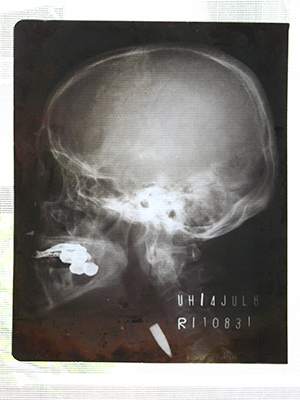Kao Chung-Li’s work investigates the relationship between history and personal biography, between time, images, and media. He is a photographer and a collector of historical pictures as much as a filmmaker, animator, and media-archeologist. “Taking a picture means an interruption of reality. Showing that picture means a cessation of fantasy,” states the artist. For him, the slideshow in particular sustains a tension between image, time, and stillness—and is situated beyond fantasy and reality, subsuming both photography’s indexical relation to past events, and the expectancy of cinematic time and storytelling.
The protagonist of both works—a slideshow and a new video—shown here is Kao Chung-Li’s father, now 93 years old. The story told spans more than 90 years. A key motif in this work is the bullet in the father’s body, which has remained in his lower cranium since the days of the Chinese Civil War. Shot in the head by the Liberation Army during the Huaihai Campaign in 1948–49—a battle that was decisive for the victory of Communists over the KMT—this bullet has remained as a material witness.
Chung-Li’s father was born in the year of the May 4th Movement, and thus his biography stands for the Chinese historical experience of the twentieth century, set against the global histories of colonization, the wars of decolonization, and the struggles against neo-colonialism in the era that has called itself “globalization.” What is being told here is a counter-story to the hegemonic version of a “universal history” entailed in the propagandistic promise of progress and modernization. The universality of historical experience —that is, general validity beyond a particular context—is here equated with the systemic violence suffered by the vast majority of humanity under colonial and imperialistic regimes. “History is like a language; it is not merely some random noises. A lot of histories are like dialects—restricted by region. Some histories, however, cannot be so restricted,” states the artist in commenting on the work. “If we compare my fathers age to a language, I think we ought to learn that language, at least enough to comprehend it.”
The new video The Way Station Trilogy completes the biography, interlacing the father’s recollection with animated scenes, childhood memories, and Kao Chung-Li’s own life.
Kao Chung-Li, born 1958 in Taiwan, lives and works in Taipei

